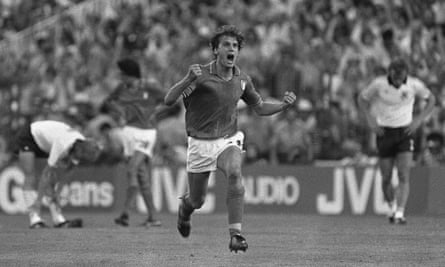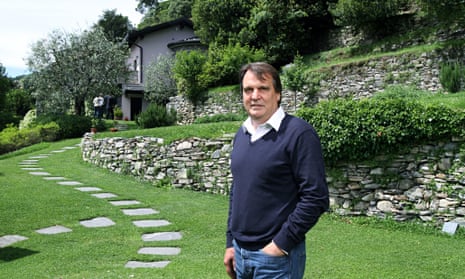Marco Tardelli keeps his 1982 World Cup replica trophy under lock and key in a bank vault. The great Juventus and Italy midfielder is less sure of the whereabouts of the other medals he won during a playing career that was characterised by a little silk and lashings of steel. “The memories are all there,” the 60-year-old says, tapping his temple.
There is one piece of silverware that means nothing to him. It ought to have been up there with the most cherished – the night when Giovanni Trapattoni’s Juventus team beat Liverpool to win the club’s first European Cup. But Heysel 1985 is synonymous with unbearable sadness and the enduring question as to how 39 people could have gone to enjoy a football match and never come back.
For Tardelli the memories have not faded, and will not. There is the temptation to consider them particularly poignant right now, after the 30-year anniversary of the tragedy last Friday and before Juventus’s appearance in the Champions League final against Barcelona on Saturday night. But the pain jabs regardless.
“You feel it all the time,” Tardelli says. “You carry it with you, it never leaves you. You don’t just remember it every 10 years or 20 years. It is with you and, sometimes, you think about it. It is part of you. The final in Brussels was a defeat for everybody on all levels. I don’t count it as a winners’ medal in any way.”
Tardelli attended the memorial service at the Gran Madre di Dio church in Turin last Friday – the current Juventus squad were also present – and there is disbelief and despair when he addresses the subject. Each of his anecdotes tug hard at the heart strings.
“We managed to get one father and his son of about 12 years old into the tunnel, near to the dressing rooms,” Tardelli says. “The boy was crying and he was really scared. The police had briefly opened the gates in Sector Z of the stadium before closing them and the father and son had managed to come across the pitch and reach the tunnel.
“The father was clearly in shock but he was determined to save his son. He was shouting for help. I was standing there with a couple of other players and there was a policeman or somebody at the entrance. I urged him to let them in. It was the natural thing to do. I was a father, too. My daughter would have been eight at the time.”
Tardelli had not wanted to play the game after the violence and carnage that erupted beforehand, which saw Juventus fans pressed against a collapsing wall as they fled a charge from Liverpool hooligans. Nobody had wanted to play but Uefa – motivated by its TV contract, according to Tardelli – demanded that it eventually went ahead on the night.
“The stadium should not have hosted such an event, as it was not up to par, and it was a mistake on behalf of the Belgian police to put the hooligans so close to the Italians in Sector Z,” Tardelli says. “It was also a mistake from Uefa not to call the match off. I remember going out from the dressing room to speak to the supporters on the curva. The police didn’t give them a chance to run away across the pitch. They should have opened the gates. They kept the Italians in the wolf’s den.”
Tardelli bears no malice towards Liverpool and he marvelled at the professionalism of the players. “We scored our winning goal from a penalty and it was outside the area,” Tardelli says, holding his hands two feet apart to reinforce the point. “The Liverpool players could have kicked up a fuss but they didn’t. They were just in shock.
“Their goalkeeper, Bruce Grobbelaar, came on to our bus afterwards to apologise for what had happened on behalf of the team and the club, which was nice of him. There was nothing against Liverpool. The players and the club were amazing. And it wasn’t so much that the Italian people had feelings against the English. It was more a case that the English people had feelings against the English hooligans. We felt bad for what had happened to us. It wasn’t so much feeling a negative thing against Liverpool.”
Tardelli has been happy to see Juventus’s progress under Massimiliano Allegri this season. The European game, he argues, needs the Old Lady to look her best. Yet Tardelli has concerns for the broader health of Italian football, particularly when he considers the ongoing issues with hooliganism.
“I appreciated what England decided to do after Hillsborough in 1989, when they moved to end hooliganism,” Tardelli says. “They really did it. In Italy, we have been trying since 1977 and every time something really bad happens, they say: ‘From now, zero tolerance. It is over.’ But they have just been words.
“There is not the willingness to attack the problem in Italy. They have sympathised but nothing has been done. There have been clubs who have worked with the ultras because they’ve been blackmailed. If the club didn’t give money for transfers or to have the flags and banners made, then you had trouble. And you would spend more money fixing the stadium than if you had bought the banners. At Juventus, it was never one of the big problems but it has been endemic.”
Then, there is the issue of corruption; the nagging, decades-old fear that every Italian football official has his price. “At the back of their minds, Italian people always have the thought that if you are winning, you are cheating in some way,” Tardelli says. “Maybe you are friends with the referee. If you are doing well, then something is wrong. England is different, because all people believe in the referee. They may not like what he does but they respect his integrity. In Italy, no. They think the referee is for the biggest teams and against the little ones.”
For Juventus, the nadir came in the 2006 Calciopoli match-fixing scandal, in which the executives Luciano Moggi and Antonio Giraudo were accused of influencing refereeing assignments and arranging for key players in other teams to be booked in matches against their club. Four other clubs were involved but Juventus were hit the hardest. They were stripped of their 2005 and 2006 Serie A titles and sent down to Serie B. They were the only club to be relegated.
Tardelli likens the punishment to a necessary purging. “It was very bad but it gave the club an opportunity to start again and to clean their image, to be more transparent about what they were doing,” Tardelli says. “The other teams, who acted in the same way but did not get relegated, did not get the clean break. Juventus started again and now they are better.
“The club has grown financially and won league titles again. It has gone back to being a Juventus club. We have another Agnelli as the president [Andrea], who is the son of [the former president] Umberto Agnelli. It is going back towards the glory days.”
Few men have a better appreciation of the old Juventus ethos than Tardelli. He joined the club from Como as a 20-year-old in 1975 for one billion lira, or the equivalent of €2m and, over 10 seasons, he won everything: five Serie A titles, two Italian cups, the Uefa Cup, the European Cup Winners’ Cup and the European Super Cup, before Heysel.

“Juventus belonged to the Agnelli family, a great family, who also owned Fiat,” Tardelli says. “And they managed it in the same way that they managed Fiat. With the same standards. It was forbidden, for example, to get a tattoo. It was disciplined; not restrictive but you had to follow the rules. They insisted that we studied, because their philosophy was that it would be easier to manage a player who has culture and intelligence. I studied as a surveyor in my spare time and I finished my degree.”
The popular perception of Tardelli is shaped by explosive passion and old-school cynicism. His running and screaming goal celebration after he had given Italy an unassailable 2-0 lead against West Germany in the 1982 World Cup final is one of the tournament’s iconic images while he is similarly open about the darker side to his game. There is an amusing moment when he is asked whether the reputation for dirtiness was deserved. Tardelli simply nods. His friend and interpreter, Manuela Spinelli, cuts in. “Yes, it was,” she says, with a smile.
“I could be harsh,” Tardelli says. “But I was never as bad as Nobby Stiles. And I never moaned when I got it. I fought against Zico and I fought against Kevin Keegan. I remember a game against England at Wembley and I gave Keegan an elbow in the face. Did he go down? Yes.
“I fought against Diego Maradona. He would take it and not say a word. I don’t think today’s players could play the football we played. It was very tough. Maradona is the best in the world, ever. And he was also a good man, very generous. All players loved him. Forget the other things, Maradona was a good man, a genuine person.”
Tardelli is a smooth raconteur, and he was recently invited to address the United Nations in New York, as part of his work as a Goodwill Ambassador for the Associazione Diplomatici. He is a man of depth and taste, as illustrated by the Barolo in his wine rack. His home in Cernobbio is unprepossessing yet stylish, with no traces of football memorabilia. He is converting the adjacent annexe into a holiday rental. The views out over Lake Como make you glad to be alive. George Clooney is a neighbour.
Tardelli sparkles as he recounts the tales of his former Juventus team-mates. Michel Platini? “Smart, funny and ironic. He never missed a training session and his attitude brought us together.” Zbigniew Boniek? “I remember when he arrived in Italy, him buying clothes … just spending money left, right and centre. Platini was French. Boniek was a bit Neapolitan.” Claudio Gentile? “The nicest and funniest guy.”
Tardelli tells the story of how Paolo Rossi, the destroyer of Brazil at the 1982 World Cup, returned to the country some years later and was booted out of his taxi when the driver eventually identified him. Tardelli’s admiration for Liam Brady, meanwhile, went beyond the Irishman’s skill on the ball. “The first time I was out with him, I drank so much beer that I was in a very bad way,” Tardelli says. “Liam, on the other hand, was completely fine.”
Tardelli’s last job in the game was as Trapattoni’s assistant for the Republic of Ireland; Brady was also on the staff. It ended in September 2013 and Tardelli, who has been working as a pundit for Italian TV, is keen to get back into management. His immediate thoughts, though, are for Juventus, and how they might stop Barcelona, with Lionel Messi, Luis Suárez and Neymar.
“How would I stop them?” Tardelli says. “I would do what I did against Maradona … but you can’t play like that now, so I don’t know. Maybe they need holy water. What I like about this Juventus team is their determination. They fight until the end. They are not the ultimate dream team yet but this is one match. Anything is possible.”
